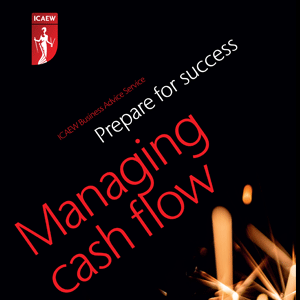Managing Cashflow

When running your own business, planning and managing
your own cash flow is extremely important. Ensure you take
all of your costs into consideration – such as contracts with
suppliers, demand from customers, and your bank balance –
so you can avoid problems along the way which may cause
your business to fail.
Managing Cash Flow, Prepare for success
We outline here why you should manage
your cash flow and what you should do to
achieve this.We outline here why you should manage
your cash flow and what you should do to
achieve this.
An ICAEW survey revealed that 58% of
micro businesses (less than 10 employees)
and 35% of small and medium-sized
businesses (between 10 and 250
employees) had no debt. Many business
people must wonder how they can manage
without borrowing. The answer is largely
because of good management of cash flow.
Why is cash flow important?
You might think that profitability is more
important. Well, there is an old maxim that
no business ever collapsed because of lack
of profitability but many have gone under
because they lacked cash. Having cash
allows a business to operate.
So managing your cash resources and
making sure you have enough to meet
your needs eg, paying wages, buying
supplies, or meeting your personal financial
requirements, is absolutely critical.
Starting up – things soon get
complicated
Most businesses start with a small amount
of cash from the proprietor. As they build
up the business they leave sufficient
funds in the business to cover the bills.
Problems often start when they offer credit
to customers or buy on credit. Or they
take on an employee or a sub-contractor
who requires regular payment. Suddenly
cash flow – payment from customers and
payment of supplies bought on credit –
becomes an issue.
Get a grip – do a regular cash flow
forecast
It’s at this point that you need to establish
some good habits. Start by making sure
that the business accurately and regularly
records details of trading transactions.
This might be in a manual cashbook,
on a computer using a spreadsheet or
accounting software, or using a simple
‘paid’/’unpaid’ system for bills. The essential
point is that the accounting records allow
the business to instantly find out what
monies are owed from customers and the
amounts it owes to suppliers.
Download the full document here
Prepare for business,
prepare for success.
ICAEW Business Advice Service
The ICAEW Business Advice Service (BAS) provides
professional advice for start-ups and owner-run businesses.
As well as practical help online in the form of white papers,
short PDFs and blog articles, we enable businesses to
receive an initial consultation at no charge from an ICAEW
Chartered Accountant.
ICAEW Chartered Accountants are the biggest source
of business advice, reaching over 1.5m businesses from
more than 20,000 offices across the UK.
If you need further help with VAT issues,
a free initial discussion with an ICAEW
Chartered Accountant is a good place to
start. Visit businessadviceservice.com
This leaflet is part of a series.
To find out more see our resources page
